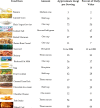Iodine consumption and cognitive performance: Confirmation of adequate consumption
- PMID: 30258574
- PMCID: PMC6145226
- DOI: 10.1002/fsn3.694
Iodine consumption and cognitive performance: Confirmation of adequate consumption
Erratum in
-
Corrigendum.Food Sci Nutr. 2021 Jan 19;9(2):1256. doi: 10.1002/fsn3.2123. eCollection 2021 Feb. Food Sci Nutr. 2021. PMID: 33598209 Free PMC article.
Abstract
Iodine, a dynamic nutrient present in thyroid hormones, is responsible for regulating thyroid function, supporting a healthy metabolism, and aiding growth and development. Iodine is also essential for brain development during specific time windows influencing neurogenesis, neuronal and glial cell differentiation, myelination, neuronal migration, and synaptogenesis. About 1.5 billion people in 130 countries live in areas at risk of iron deficiencies (IDs). Reduced mental ability due to IDs occurs in almost 300 million people. Ensuring the consumption of minimum recommended daily allowances of iodine remains challenging. The effects of ID disorders range from high mortality of fetuses and children to inhibited mental development (cretinism). Poor socioeconomic development and impaired school performance are also notable. Currently, ID disorders are the single greatest contributor to preventable brain damage in fetuses and infants and arrested psychomotor development in children. Iodized salt may help fulfill iodine requirements. Increases in food salt iodization programs can help overcome ID disorders. Dietary plans can be well adjusted to incorporate iodinated foods. Maternal iodine supplementation for offspring requires adequate attention. Fruits, vegetables, bread, eggs, legumes (beans and peas), nuts, seeds, seafood, lean meats and poultry, and soy products provide small quantities of iodine. Nutrient-dense foods containing essential vitamins and minerals such as iodine may confer positive effects. To some extent, fortified foods and daily dietary supplements can be provided for different nutrients including iodine; otherwise, iodine may be consumed in less than the recommended amounts. This review focuses on aspects of adequate iodine consumption to avoid cognitive impairments.
Keywords: cognitive performance; cretinism; dietary plan; food salt iodization program; iodine.
Figures
References
-
- Assessment of iodine deficiency disorders and monitoring their elimination: A guide for programme managers (2007). Retrieved from http://apps.who.int/iris/bitstream/10665/43781/1/9789241595827_eng.pdf
-
- 25 iodine rich foods you should include in your diet (2014). Retrieved December 4, 2017, from https://www.healthbeckon.com/iodine-rich-foods/
-
- Fortification of foods: Historical development and current practices (2017). Retrieved December 9, 2017, from http://archive.unu.edu/unupress/food/8F154e/8F154E03.htm
-
- Iodine — Health Professional Fact Sheet (2018). Retrieved February 2018, from https://ods.od.nih.gov/factsheets/Iodine-HealthProfessional/
Publication types
LinkOut - more resources
Full Text Sources
Other Literature Sources




